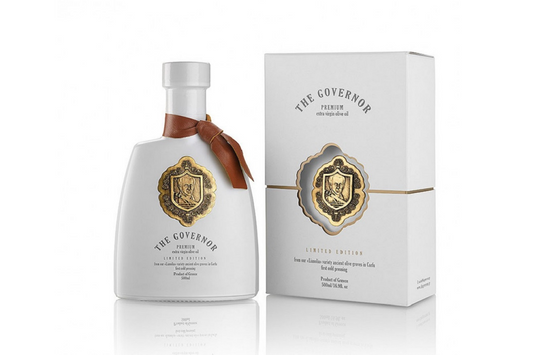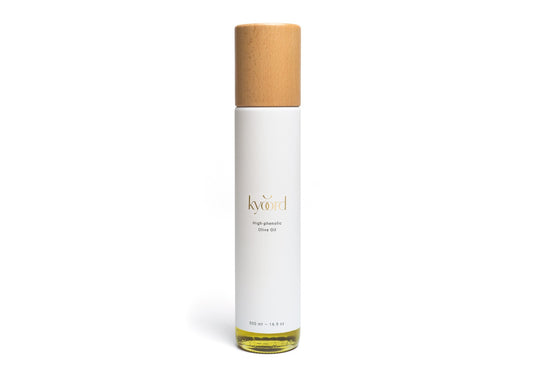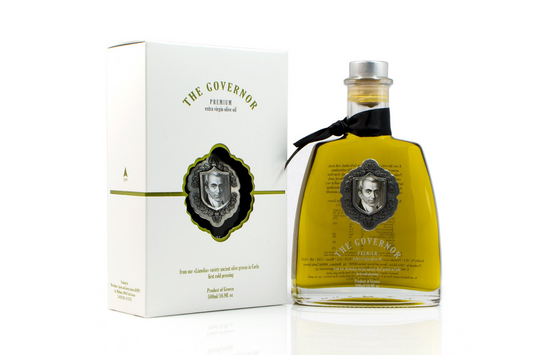Cardiovascular diseases are the leading cause of death globally. It’s not just about heart attacks or strokes; it's more about this amalgamation of heart conditions like high cholesterol, obesity, and high blood sugar collectively known as Metabolic Syndrome.
When you have Metabolic Syndrome, your risk of heart disease is elevated. Unfortunately, it takes a while to find out you have this problem, which stresses out your heart long before a disease is formally detected and properly diagnosed.
Here’s where high phenolic olive oil steps in, with active compounds that could potentially protect your heart.
Study: Cardioprotective Potential of Oleuropein, Hydroxytyrosol, Oleocanthal and Their Combination
For years, researchers have known that the Mediterranean diet, rich in olive oil, can help prevent heart disease. But what's been unclear so far is why.
A 2024 paper published in the Journal of Redox Biology attempted to answer that very question. They set out to find the answer using animal models and a clinical trial to see how three major olive oil compounds—oleuropein, hydroxytyrosol, and oleocanthal—perform when given individually and in combination.
Experimental Design: Mice Models and Humans
Researchers used a two-pronged approach:
- Conducted experiments on mice and followed up with a small clinical trial in humans. Why mice? Because it lets scientists simulate human conditions (like heart attacks) in a controlled way.
- Once they identified the compounds that showed promise in mice, they tested them on humans to see if the results held up.
Methodology
Mice Models: The first set of experiments involved mice fed a Western Diet (burgers, pizza, but in rodent portions) to induce Metabolic Syndrome. Then, the mice were given individual doses of oleuropein, hydroxytyrosol, oleocanthal, and a blend of all three to see how these compounds affected heart health.They looked at factors like:
- Infarct Size: Essentially how much heart muscle dies after a simulated heart attack.
- Blood Glucose Levels: How these compounds affect sugar metabolism in Metabolic Syndrome.
- Oxidative Stress and Cholesterol: This is all about how well your heart defends itself from cellular damage and cholesterol buildup.
Human Clinical Trial
In the human trial, patients with Chronic Coronary Artery Syndrome (people who’ve had coronary artery disease) were given a supplement with oleuropein, hydroxytyrosol, and oleocanthal.
Researchers monitored their heart health, blood markers, and other indicators of cardiovascular function over a month. This was to see if the compounds from olive oil could make a difference in humans just like in mice.
Results: Olive Oil Provides Potent Heart Disease Protection
The findings confirmed that olive oil protects your heart against heart disease, but not all the compounds displayed similar protective effects.
-
Oleuropein: Oleuropein metabolites are found in high-phenolic olive oil. Among the three compounds, it performed best when it came to reducing infarct size—the amount of heart tissue that dies after a heart attack. Mice treated with oleuropein had less damage after heart attacks. Plus, it significantly lowered blood sugar levels, which means it could be an ideal complementary treatment for managing both heart disease and metabolic syndrome.
-
Hydroxytyrosol: Despite being known to lower LDL cholesterol, hydroxytyrosol’s heart-protective effects weren’t as impressive as oleuropein. However, when combined with oleuropein and oleocanthal, it enhanced the blend’s overall antioxidant and anti-inflammatory effects.
- Oleocanthal: Oleocanthal is known to help fight chronic inflammation and lower oxidative stress. It also possesses potent anti-angiogenic effects.
When all three compounds were combined, the results were highly positive towards their heart-protective properties. The blend reduced heart damage, improved blood sugar control, and had anti-inflammatory effects. In fact, in humans, this blend improved blood flow and reduced markers of oxidative stress.
Significance: Why This Matters for You (and Your Heart)
You’ve probably heard that eating a Mediterranean diet is good for you, but this study gives us a peek into why. It’s not just about avoiding processed food; it's about what’s in the olive oil. These compounds could, one day, be used in supplements to protect those at high risk of heart disease, or maybe even after a heart attack to minimize damage.
Moreover, this study opens up a whole new chapter in personalized heart care.
With further research, medical science could advance enough to tailor heart disease prevention strategies using these potent olive oil compounds. A future scenario might be getting a prescription from your doctor to consume high phenolic olive oil — whether as a preventative measure or to combat an ongoing condition.
- Holistic Cardioprotection: Instead of just managing your cholesterol or your blood sugar separately, these compounds can hit multiple targets at once—reducing heart damage, improving blood sugar, and lowering cholesterol.
- Nutritional Dosages Matter: The dosages used in the study mimic what you’d get from a Mediterranean diet, meaning you don’t need to take a pharmaceutical-level dose to see benefits.
- Prevention and Treatment: These compounds didn’t just work in healthy mice—they showed real benefits in mice with metabolic syndrome, meaning they could potentially help those already struggling with metabolic issues.
FAQs
What Do Cardiologists Say About Olive Oil?
The consensus among cardiologists seems to point out that higher olive oil intake is associated with a much lower risk of cardiovascular disease mortality. Many agree that replacing everyday fats like butter, margarine, and some vegetable oils with olive oil can confer heart-protective effects.
What Are the Side Effects of Too Much Olive Oil?
Many of us at kyoord, as well as our customers consume several tablespoons of olive oil a day with no side effects whatsoever. Remember that olive oil contains about 119 calories per tablespoon, so if you are planning to eat a few of these daily, you should consider cutting other sources of calories from fat. The higher the polyphenols level in the olive oil, the easier it should be to consume your desired level of nutrients without overdoing it in the calorie department. Some symptoms of over consumption include diarrhea, heartburn, cramps, low blood pressure, and weight gain.
Is Frying in Olive Oil Healthy for Your Heart?
The monounsaturated fats in olive oil make it one of the healthiest fats for frying. Further, the antioxidants in high-phenolic olive oil protect the fatty acids from oxidation, thus making it more stable than other oils used for high heat cooking.
Why is Olive Oil Bad for Your Heart?
Olive oil is not bad for your heart. Olive oil is one of the most heart-healthy oils to consume and cook with. In fact, various studies have shown that the healthy fats and compounds, including oleocanthal, oleuropin, and hydroxytyrosol, can protect the heart against disease.
Is Olive Oil Good For You If You Have High Cholesterol?
Yes! Studies have shown that extra virgin olive oil, specifically those with high levels of anti-inflammatory and antioxidant molecules, can reduce "bad" cholesterol. Additionally, research suggests that diets rich in healthy monounsaturated fats can decrease levels of LDL ("bad') cholesterol, while increasing HDL (or "good") cholesterol.









